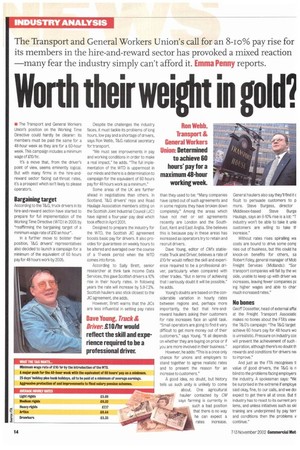Worth their weight in pit?
Page 14

If you've noticed an error in this article please click here to report it so we can fix it.
The Transport and General Workers Union's call for an 8-io% pay rise for its members in the hire-and-reward sector has provoked a mixed reaction —many fear the industry simply can't afford it. Emma Penny reports.
• The Transport and General Workers Union's position on the Working Time Directive could hardly be clearer: its members must be paid the same for a 48-hour week as they are for a 60-hour week. This campaign includes a minimum wage of £10/hr.
It's a move that, from the driver's point of view, seems eminently But with many firms in the hire-andreward sector facing cut-throat rates, it's a prospect which isn't likely to please operators.
Bargaining target
AccordIng to the T&G, truck drivers in its hire-and-reward section have started to prepare for full implementation of the Working Time Directive (WTD) in 2005 by "reaffirming the bargaining target of a minimum wage rate of £10 an hour".
In a further move to bolster their position, T&G drivers' representatives also decided to launch a campaign for a minimum of the equivalent of 60 hours pay for 48 hours work by 2005. Despite the challenges the industry faces, it must tackle its problems of long hours, low pay and a shortage of drivers, says Ron Webb, T&G national secretary for transport.
"We must see improvements in pay and working conditions in order to make a real impact," he adds. "The full implementation of the WTD is uppermost in our minds and there is a determination to campaign for the equivalent of 60 hours pay for 48 hours work as a minimum."
Some areas of the UK are further ahead in negotiations than others. In Scotland, T&G drivers' reps and Road Haulage Association members sitting on the Scottish Joint Industrial Council (JIC) have signed a four-year pay deal which took effect in April 2001.
Designed to prepare the industry for the WTD, the Scottish JIC agreement boosts basic pay for drivers. It also provides for guarantees on weekly hours to be altered and averaged over the course of a 17-week period when the WTD comes into force.
According to Sally Brett, senior researcher at think tank Income Data Services, this gave Scottish drivers a 10% rise in their hourly rates. In following years the rate will increase by 5.9-7.2%. Scottish hauliers also stick closest to the JIC agreement, she adds.
However, Brett warns that the JICs are less influential in setting pay rates than they used to be: "Many companies have opted out of such agreements and in some regions they have broken down completely." Among the areas which have not met or set agreements recently are London and the SouthEast, Kent and East Anglia. She believes this is because pay in these areas has increased as operators try to retain and recruit drivers.
Dave Young, editor of CM'S stablemate Truck and Driver, believes a rate of £10/hr would reflect the skill and experience required to be a professional driver, particularly when compared with other trades. 'But in terms of achieving that 1 seriously doubt it will be possible," he adds.
Young's doubts are based on the considerable variation in hourly rates between regions and, perhaps more importantly, the fact that hire-andreward hauliers asking their customers for rate increases face an uphill task. "Small operators are going to find it very difficult to get more money out of their customers," says Young. "R all depends on whether they are buying on price or if you are more involved in their business."
However, he adds: "This is a once only chance for unions and employers to stand together to agree realistic rates and to present the reason for an increase to customers."
A good idea, no doubt, but history tells us such unity is unlikely to come about. One agricultural haulier contacted by CM says farming is currently in
such a bad position that there is no way he can expect a rates increase. General hauliers also say they'll find it c ficult to persuade customers to p more. Steve Burgess, director Middlesex-based Steve Burge Haulage, says an 8-10% rise is a lot: "T industry won't be able to take it unle customers are willing to take tt increase."
Without rates rises spiralling wa costs are bound to drive some comr nies out of business, but this could ha knock-on benefits for others, sa Robert Foley, general manager of Mob Freight Services (Midlands): "Sor transport companies will fall by the en side, unable to keep up with driver wa increases, leaving fewer companies ing higher wages and able to char much increased rates."
No bones
Geoff Dossetter, head of external affai at the Freight Transport Associatic makes no bones about the FTA's view the T&G's campaign; 'The T&G target achieve 60 hours pay for 48 hours we is unrealistic. Pressure on industry cot will prevent the achievement of such aspiration, although there's no doubt th rewards and conditions for drivers nei to improve."
And just as the FTA recognises ti value of good drivers, the T&G is n blind to the problems facing employers the industry, A spokesman says: 'WE be surprised in the extreme if employe said okay, fine, to our calls, and we doi expect to get there all at once. But ti industry has to react to its current pro lems, and unless initiatives such as ski training are underpinned by pay ten' and conditions then the problems v continue."




























































































































































